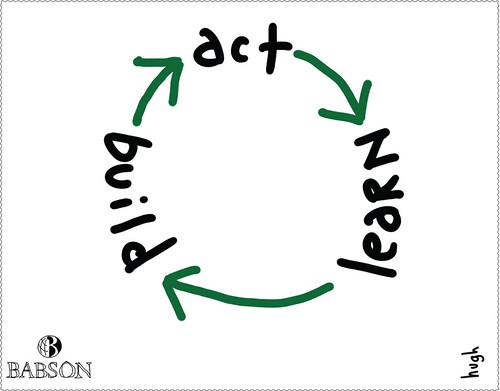Act-Learn-Build
 What do you call people who are experts at navigating extreme uncertainty while minimizing risk? Serial entrepreneurs is the correct answer according to the authors of Just Start: Take Action, Embrace Uncertainty, Create the Future (see previous post for complete citation). Serial entrepreneurs don’t start with a predetermined goal in mind. Rather, they allow opportunities to emerge.
What do you call people who are experts at navigating extreme uncertainty while minimizing risk? Serial entrepreneurs is the correct answer according to the authors of Just Start: Take Action, Embrace Uncertainty, Create the Future (see previous post for complete citation). Serial entrepreneurs don’t start with a predetermined goal in mind. Rather, they allow opportunities to emerge.
“Instead of focusing on optimal returns, they spend more time considering their acceptable loss; instead of searching for perfect solutions, they look for good enough ones,” write authors Leonard A. Schlesinger, Charles F. Kiefer and Paul B. Brown
In other words, serial entrepreneurs act first, learn from those first small steps and then build on the lessons learned. Sometimes the lesson is that it’s not worth going further. Other times it’s clear that opportunity exists and further steps should be taken to maximize it.
An in-depth study of 27 serial entrepreneurs by an associate professor of business administration at the University of Virginia’s Darden School of Business, Saras D. Sarasvathy, confirmed that “act-learn-build” is a surprisingly effective way to create new products and services.
Here’s how it works in a nutshell, as summarized in the article “New Project? Don’t Analyze—Act” in the March 2012 issue of Harvard Business Review:
Act: Take a small step toward a goal.
Learn: Evaluate the evidence you’ve created.
Build: Repeat steps 1 and 2 until you accomplish your goal, realize you can’t, or opt to change direction on the basis of new information.
“You’re not flying blind, you’re moving forward carefully, eyes wide open. You’re alert to any looming danger—or opportunity,” write authors Schlesinger, Kiefer and Brown.
They go on to note: “We acknowledge that action before analysis can be, well, unpredictable—and messy. And we concede that it’s antithetical to the way most organizations work. However, in the long term, taking lots of small steps actually reduces risk, which makes such an approach ideal for tackling challenges and getting fledgling initiatives off the ground, particularly in today’s skittish corporate environment. And such innovation is critically important not only for companies that want to stay competitive but also for enterprising employees who want to feel fulfilled in their jobs.”
I could not agree more wholeheartedly. In my subsequent posts in this series I will explain how the “Act-Learn-Build” approach has worked in practice at Intertech.